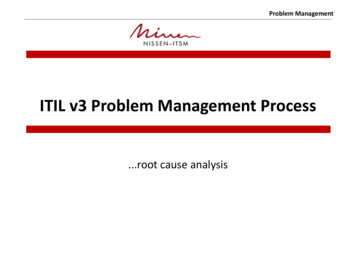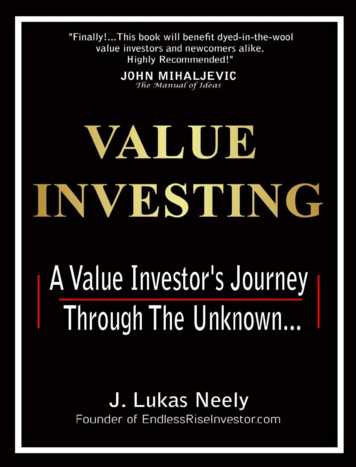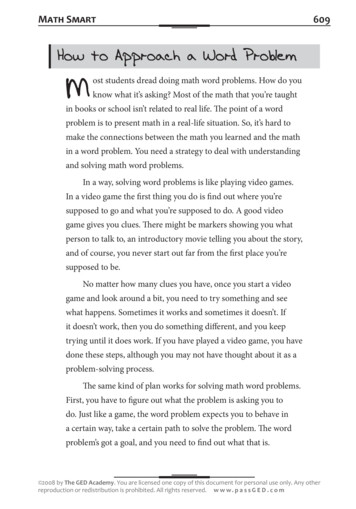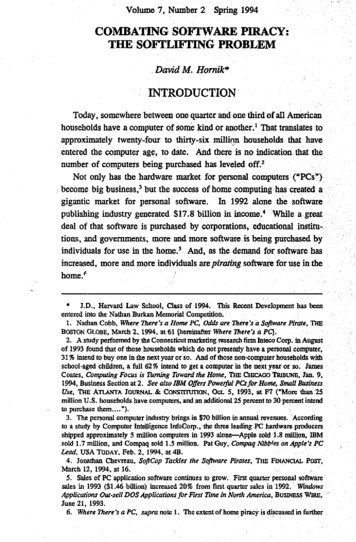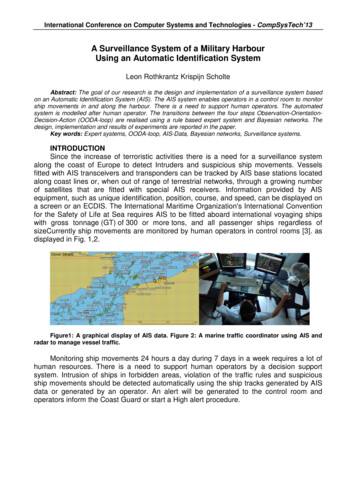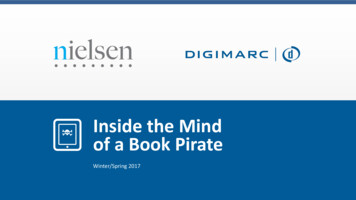
Transcription
the problem isn't piracy.the problem is obscurity.Cory Doctorow on Why Authors Should Give Their WorkAway, Stop Sweating Copyright and Focus on Buildinga Community of Readers.Compiled by the Editors of Children's Book Insider,The Newsletter for Children's Writers
This file is licensed under a Creative Commons US Attribution-NonCommercial-ShareAlike sa/3.0/You are free:* to Share — to copy, distribute and transmit the work* to Remix — to adapt the workUnder the following conditions:* Attribution — You must attribute the work in the manner specified by the author or licensor (but not in any waythat suggests that they endorse you or your use of the work).* Noncommercial — You may not use this work for commercial purposes.* Share Alike — If you alter, transform, or build upon this work, you may distribute the resulting work only underthe same or similar license to this one.With the understanding that:* Waiver — Any of the above conditions can be waived if you get permission from the copyright holder.* Other Rights — In no way are any of the following rights affected by the license:* Your fair dealing or fair use rights;* The author's moral rights;* Rights other persons may have either in the work itself or in how the work is used, such as publicity orprivacy rights. Notice — For any reuse or distribution, you must make clear to others the license terms of this work.All writings in the books, aside from the foreword, are the work of Cory Doctorow.website, http://craphound.comTo learn more about him, visit hisThis eBook compiled by:Children's Book Insider, The Newsletter for Children's WritersFort Collins, Coloradohttp://cbiclubhouse.com
When I asked Cory Doctorow if he'd be good with us compiling his trenchant and oftenvisionary book introductions into this eBook, he replied “Sure. But you really didn't haveto ask.”That's because Doctorow's works (tech-savvy novels for adults and young adults) arepublished under Creative Commons (which he'll explain in the next few pages far betterthan I could) and anyone is free to reuse, remix or reimagine his words.That's a concept that seems foreign and more than a bit scary to most authors, who havebeen raised to revere traditional copyright and who live in mortal (and largely unjustified)terror of their works being stolen from under them.In this eBook, Doctorow makes his case for why traditional copyright is an outmodedconcept, why you should give as much of your work as possible away for free and whyeBooks may be the answer to authors' prayers.Cory Doctorow isn't some Utopian dreamer who's taken a vow of poverty. He's a wildlysuccessful author who, it seems, is doing just fine financially playing under these newrules. He's proof that there's money to be made and books to be sold.while givingeverything away. That seems counterintuitive and perhaps a bit hard to believe, but I'llallow him to offer up the how's and why's. You still may not buy into everything he hasto say, but the point of his writings (and of this eBook) is to start discussion, not lay outmore dogma. Take what you like, and set the rest aside for future consideration.The essays you're about to read are excerpted from Doctorow's introductions to theelectronic editions for his books (along with a few selections from CONTENT: SelectedEssays on Technology, Creativity, Copyright and the Future of the Future). When you'redone absorbing them, go read the books themselves. They're a trip. The man can write.You can download them at http://craphound.combuying them at your local bookstore.And then, I'm betting, you'll beBecause that's how it works now.Jon BardManaging Editor, Children's Book Insider, The Newsletter for Children's Writershttp://cbiclubhouse.com
Table of ContentsFrom Little Brother.4From Makers .8From Overclocked: Stories of the Future Present .11From Someone Leaves, Someone Comes to Town.12Why do I do this? .12Developing nations.14DRM.15From Eastern Standard Tribe .17From A Place So Foreign and Eight More .21From Down and Out in the Magic Kingdom .23From CONTENT: Selected Essays on Technology, Creativity,Copyright and the Future of the Future.26Giving it Away.26How Copyright Broke .30Ebooks: Neither E, Nor Books .33Free(konomic) E-books.48
From Little Brotherhttp://craphound.com/littlebrotherTHE COPYRIGHT THINGThe Creative Commons license at the top of this file probably tipped you off to thefact that I've got some pretty unorthodox views about copyright. Here's what Ithink of it, in a nutshell: a little goes a long way, and more than that is too much.I like the fact that copyright lets me sell rights to my publishers and film studiosand so on. It's nice that they can't just take my stuff without permission and getrich on it without cutting me in for a piece of the action. I'm in a pretty goodposition when it comes to negotiating with these companies: I've got a greatagent and a decade's experience with copyright law and licensing (including astint as a delegate at WIPO, the UN agency that makes the world's copyrighttreaties). What's more, there's just not that many of these negotiations -- even ifI sell fifty or a hundred different editions of Little Brother (which would put it intop millionth of a percentile for fiction), that's still only a hundred negotiations,which I could just about manage.I *hate* the fact that fans who want to do what readers have always done areexpected to play in the same system as all these hotshot agents and lawyers. It'sjust *stupid* to say that an elementary school classroom should have to talk to aJoin Children's Book Insider Today!
lawyer at a giant global publisher before they put on a play based on one of mybooks. It's ridiculous to say that people who want to "loan" their electronic copyof my book to a friend need to get a *license* to do so. Loaning books has beenaround longer than any publisher on Earth, and it's a fine thing.I recently saw Neil Gaiman give a talk at which someone asked him how he feltabout piracy of his books. He said, "Hands up in the audience if you discoveredyour favorite writer for free -- because someone loaned you a copy, or becausesomeone gave it to you? Now, hands up if you found your favorite writer bywalking into a store and plunking down cash." Overwhelmingly, the audience saidthat they'd discovered their favorite writers for free, on a loan or as a gift. Whenit comes to my favorite writers, there's no boundaries: I'll buy every book theypublish, just to own it (sometimes I buy two or three, to give away to friends who*must* read those books). I pay to see them live. I buy t-shirts with their bookcovers on them. I'm a customer for life.Neil went on to say that he was part of the tribe of readers, the tiny minority ofpeople in the world who read for pleasure, buying books because they love them.One thing he knows about everyone who downloads his books on the Internetwithout permission is that they're *readers*, they're people who love books.People who study the habits of music-buyers have discovered something curious:the biggest pirates are also the biggest spenders. If you pirate music all nightlong, chances are you're one of the few people left who also goes to the recordstore (remember those?) during the day. You probably go to concerts on theweekend, and you probably check music out of the library too. If you're amember of the red-hot music-fan tribe, you do lots of *everything* that has to dowith music, from singing in the shower to paying for black-market vinyl bootlegsof rare Eastern European covers of your favorite death-metal band.Same with books. I've worked in new bookstores, used bookstores and libraries.I've hung out in pirate ebook ("bookwarez") places online. I'm a stone usedbookstore junkie, and I go to book fairs for fun. And you know what? It's thesame people at all those places: book fans who do lots of everything that has todo with books. I buy weird, fugly pirate editions of my favorite books in Chinabecause they're weird and fugly and look great next to the eight or nine othereditions that I paid full-freight for of the same books. I check books out of thelibrary, google them when I need a quote, carry dozens around on my phone andhundreds on my laptop, and have (at this writing) more than 10,000 of them instorage lockers in London, Los Angeles and Toronto.If I could loan out my physical books without giving up possession of them, I*would*. The fact that I can do so with digital files is not a bug, it's a feature, anda damned fine one. It's embarrassing to see all these writers and musicians andJoin Children's Book Insider Today!
artists bemoaning the fact that art just got this wicked new feature: the ability tobe shared without losing access to it in the first place. It's like watchingrestaurant owners crying down their shirts about the new free lunch machinethat's feeding the world's starving people because it'll force them to reconsidertheir business-models. Yes, that's gonna be tricky, but let's not lose sight of themain attraction: free lunches!Universal access to human knowledge is in our grasp, for the first time in thehistory of the world. This is not a bad thing.-----------In case that's not enough for you, here's my pitch on why giving away ebooksmakes sense at this time and place:Giving away ebooks gives me artistic, moral and commercial satisfaction. Thecommercial question is the one that comes up most often: how can you give awayfree ebooks and still make money?For me -- for pretty much every writer -- the big problem isn't piracy, it'sobscurity (thanks to Tim O'Reilly for this great aphorism). Of all the people whofailed to buy this book today, the majority did so because they never heard of it,not because someone gave them a free copy. Mega-hit best-sellers in sciencefiction sell half a million copies -- in a world where 175,000 attend the San DiegoComic Con alone, you've got to figure that most of the people who "like sciencefiction" (and related geeky stuff like comics, games, Linux, and so on) just don'treally buy books. I'm more interested in getting more of that wider audience intothe tent than making sure that everyone who's in the tent bought a ticket to bethere.Ebooks are verbs, not nouns. You copy them, it's in their nature. And many ofthose copies have a destination, a person they're intended for, a hand-wroughttransfer from one person to another, embodying a personal recommendationbetween two people who trust each other enough to share bits. That's the kind ofthing that authors (should) dream of, the proverbial sealing of the deal. Bymaking my books available for free pass-along, I make it easy for people wholove them to help other people love them.What's more, I don't see ebooks as a substitute for paper books for most people.It's not that the screens aren't good enough, either: if you're anything like me,you already spend every hour you can get in front of the screen, reading text. Butthe more computer-literate you are, the less likely you are to be reading longform works on those screens -- that's because computer-literate people do moreJoin Children's Book Insider Today!
things with their computers. We run IM and email and we use the browser in amillion diverse ways. We have games running in the background, and endlessopportunities to tinker with our music libraries. The more you do with yourcomputer, the more likely it is that you'll be interrupted after five to sevenminutes to do something else. That makes the computer extremely poorly suitedto reading long-form works off of, unless you have the iron self-discipline of amonk.The good news (for writers) is that this means that ebooks on computers aremore likely to be an enticement to buy the printed book (which is, after all,cheap, easily had, and easy to use) than a substitute for it. You can probably readjust enough of the book off the screen to realize you want to be reading it onpaper.So ebooks sell print books. Every writer I've heard of who's tried giving awayebooks to promote paper books has come back to do it again. That's thecommercial case for doing free ebooks.-----------Now, onto the artistic case. It's the twenty-first century. Copying stuff is never,ever going to get any harder than it is today (or if it does, it'll be becausecivilization has collapsed, at which point we'll have other problems). Hard drivesaren't going to get bulkier, more expensive, or less capacious. Networks won't getslower or harder to access. If you're not making art with the intention of having itcopied, you're not really making art for the twenty-first century. There'ssomething charming about making work you don't want to be copied, in the sameway that it's nice to go to a Pioneer Village and see the olde-timey blacksmithshoeing a horse at his traditional forge. But it's hardly, you know,*contemporary*. I'm a science fiction writer. It's my job to write about the future(on a good day) or at least the present. Art that's not supposed to be copied isfrom the past.Finally, let's look at the moral case. Copying stuff is natural. It's how we learn(copying our parents and the people around us). My first story, written when Iwas six, was an excited re-telling of Star Wars, which I'd just seen in the theater.Now that the Internet -- the world's most efficient copying machine -- is prettymuch everywhere, our copying instinct is just going to play out more and more.There's no way I can stop my readers, and if I tried, I'd be a hypocrite: when Iwas 17, I was making mix-tapes, photocopying stories, and generally copying inevery way I could imagine. If the Internet had been around then, I'd have beenusing it to copy as much as I possibly could.There's no way to stop it, and the people who try end up doing more harm thanJoin Children's Book Insider Today!
piracy ever did. The record industry's ridiculous holy war against file-sharers(more than 20,000 music fans sued and counting!) exemplifies the absurdity oftrying to get the food-coloring out of the swimming pool. If the choice is betweenallowing copying or being a frothing bully lashing out at anything he can reach, Ichoose the former.Join Children's Book Insider Today!
From Makershttp://craphound.com/makers/There's a dangerous group of anti-copyright activists out there who pose a clearand present danger to the future of authors and publishing. They have no respectfor property or laws. What's more, they're powerful and organized, and have theears of lawmakers and the press.I'm speaking, of course, of the legal departments at ebook publishers.These people don't believe in copyright law. Copyright law says that when youbuy a book, you own it. You can give it away, you can lend it, you can pass it onto your descendants or donate it to the local homeless shelter. Owning books hasbeen around for longer than publishing books has. Copyright law has alwaysrecognized your right to own your books. When copyright laws are made -- byelected officials, acting for the public good -- they always safeguard this right.But ebook publishers don't respect copyright law, and they don't believe in yourright to own property. Instead, they say that when you "buy" an ebook, you'rereally only licensing that book, and that copyright law is superseded by thethousands of farcical, abusive words in the license agreement you click throughon the way to sealing the deal. (Of course, the button on their website says, "Buythis book" and they talk about "Ebook sales" at conferences -- no one says,"License this book for your Kindle" or "Total licenses of ebooks are up fromJoin Children's Book Insider Today!
0.00001% of all publishing to 0.0001% of all publishing, a 100-fold increase!")I say to hell with them. You bought it, you own it. I believe in copyright law'sguarantee of ownership in your books.So you own this ebook. The license agreement (see below), is from CreativeCommons and it gives you even more rights than you get to a regular book.Every word of it is a gift, not a confiscation. Enjoy.What do I want from you in return? Read the book. Tell your friends. Review it onAmazon or at your local bookseller. Bring it to your bookclub. Assign it to yourstudents (older students, please -- that sex scene is a scorcher) (now I've gotyour attention, don't I?). As Woody Guthrie wrote:"This song is Copyrighted in U.S., under Seal of Copyright #154085, for aperiod of 28 years, and anybody caught singin' it without our permission, will bemighty good friends of ourn, cause we don't give a dern. Publish it. Write it. Singit. Swing to it. Yodel it. We wrote it, that's all we wanted to do."Oh yeah. Also: if you like it, buy it or donate a copy to a worthy, cash-strappedinstitution.Why am I doing this? Because my problem isn't piracy, it's obscurity (thanks,@timoreilly for this awesome aphorism). Because free ebooks sell print books.Because I copied my ass off when I was 17 and grew up to spend practicallyevery discretionary cent I have on books when I became an adult. Because I can'tstop you from sharing it (zeroes and ones aren't ever going to get harder tocopy); and because readers have shared the books they loved forever; so I mightas well enlist you to the cause.I have always dreamt of writing sf novels, since I was six years old. Now I do it. Itis a goddamned dream come true, like growing up to be a cowboy or anastronaut, except that you don't get oppressed by ranchers or stuck on thelaunchpad in an adult diaper for 28 hours at a stretch. The idea that I'd getdyspeptic over people -- readers -- celebrating what I write is goddamned bizarreSo, download this book.This file is licensed under a Creative Commons US Attribution-NonCommercialShareAlike sa/3.0/Join Children's Book Insider Today!
You are free:* to Share — to copy, distribute and transmit the work* to Remix — to adapt the workUnder the following conditions:* Attribution — You must attribute the work in the manner specified by theauthor or licensor (but not in any way that suggests that they endorse you oryour use of the work).* Noncommercial — You may not use this work for commercial purposes.* Share Alike — If you alter, transform, or build upon this work, you maydistribute the resulting work only under the same or similar license to this one.With the understanding that:* Waiver — Any of the above conditions can be waived if you get permissionfrom the copyright holder.* Other Rights — In no way are any of the following rights affected by thelicense:* Your fair dealing or fair use rights;* The author's moral rights;* Rights other persons may have either in the work itself or in howthe work is used, such as publicity or privacy rights.* Notice — For any reuse or distribution, you must make clear toothers the license terms of this work.Join Children's Book Insider Today!
From Overclocked: Stories of the Future Presenthttp://craphound.com/overclockedPrintcrime came out of a discussion I had with a friend who'd been to hear aspokesman for the British recording industry talk about the future of "intellectualproperty." The record exec opined the recording industry's great and hystericalspasm would form the template for a never-ending series of spasms as 3Dprinters, fabricators and rapid prototypers laid waste to every industry that reliedon trademarks or patents.My friend thought that, as kinky as this was, it did show a fair amount offoresight, coming as it did from the notoriously technosqueamish record industry.I was less impressed.It's almost certainly true that control over the production of trademarked andpatented objects will diminish over the coming years of object-on-demandprinting, but to focus on 3D printers' impact on *trademarks* is a stupendouslyweird idea.It's as if the railroad were looming on the horizon, and the most visionary thingthe futurists of the day can think of to say about it is that these iron horses willhave a disastrous effect on the hardworking manufacturers of oat-bags forhorses. It's true, as far as it goes, but it's so tunnel-visioned as to be practicallyblind.Join Children's Book Insider Today!
From Someone Leaves, Someone Comes to Townhttp://craphound.com/someoneThis is my third novel, and as with my first, Down and Out in the Magic Kingdom(http://craphound.com/down) and my second, Eastern Standard Tribe(http://craphound.com/est), I am releasing it for free on the Internet the verysame day that it ships to the stores. The books are governed by CreativeCommons licenses that permit their unlimited noncommercial redistribution,which means that you're welcome to share them with anyone you think will wantto see them. In the words of Woody Guthrie:"This song is Copyrighted in U.S., under Seal of Copyright #154085, for a periodof 28 years, and anybody caught singin it without our permission, will be mightygood friends of ourn, cause we don't give a dern. Publish it. Write it. Sing it.Swing to it. Yodel it. We wrote it, that's all we wanted to do."Why do I do this?There are three reasons:* Short TermIn the short term, I'm generating more sales of my printed books. Sure, givingJoin Children's Book Insider Today!
away ebooks displaces the occasional sale, when a downloader reads the bookand decides not to buy it. But it's far more common for a reader to download thebook, read some or all of it, and decide to buy the print edition. Like I said in myessay, Ebooks Neither E Nor .txt), digital and print editions areintensely complimentary, so acquiring one increases your need for the other. I'vegiven away more than half a million digital copies of my award-winning firstnovel, Down and Out in the Magic Kingdom, and that sucker has blown through*five* print editions (yee-HAW!), so I'm not worried that giving away books ishurting my sales.* Long TermSome day, though, paper books will all but go away. We're already reading morewords off of more screens every day and fewer words off of fewer pages everyday. You don't need to be a science fiction writer to see the writing on the wall (orscreen, as the case may be).Now, if you've got a poor imagination, you might think that we'll enter that erawith special purpose "ebook readers" that simulate the experience of carryingaround "real" books, only digital. That's like believing that your mobile phone willbe the same thing as the phone attached to your wall, except in your pocket. Ifyou believe this sort of thing, you have no business writing sf, and you probablyshouldn't be reading it either.No, the business and social practice of ebooks will be way, way weirder than that.In fact, I believe that it's probably too weird for us to even imagine today, as theidea of today's radio marketplace was incomprehensible to the Vaudeville artistswho accused the radio station owners of mass piracy for playing music on the air.Those people just could *not* imagine a future in which audiences and playlistswere statistically sampled by a special "collection society" created by aCongressional anti-trust "consent decree," said society to hand out moneycollected from radio stations (who collected from soap manufacturers and otheradvertisers), to compensate artists. It was inconceivably weird, and yet it madethe artists who embraced it rich as hell. The artists who demanded that radio just*stop* went broke, ended up driving taxis, and were forgotten by history.I know which example I intend to follow. Giving away books costs me *nothing*,and actually makes me money. But most importantly, it delivers the very bestmarket-intelligence that I can get.When you download my book, please: do weird and cool stuff with it. Imaginenew things that books are for, and do them. Use it in unlikely and surprisingways. Then *tell me about it*. Email me (doctorow@craphound.com) with thatJoin Children's Book Insider Today!
precious market-intelligence about what electronic text is for, so that I can be thefirst writer to figure out what the next writerly business model is. I'm anentrepreneur and I live and die by market intel.Some other writers have decided that their readers are thieves and pirates, andthey devote countless hours to systematically alienating their customers. Thesewriters will go broke. Not me -- I love you people. Copy the hell out of this thing.* Medium TermThere may well be a time between the sunset of printed text and the appearanceof robust models for unfettered distribution of electronic text, an interregnumduring which the fortunes of novelists follow those of poets and playwrights andother ink-stained scribblers whose industries have cratered beneath them.When that happens, writerly income will come from incidental sources such aspaid speaking engagements and commissioned articles. No, it's not "fair" thatnovelists who are good speakers will have a better deal than novelists who aren't,but neither was it fair that the era of radio gave a boost to the career of artistswho played well in the studios, nor that the age of downloading is giving a boostto the careers of artists who play well live. Technology giveth and technologytaketh away. I'm an sf writer: it's my job to love the future.My chances of landing speaking gigs, columns, paid assignments, and the rest ofit are all contingent on my public profile. The more people there are that haveread and enjoyed my work, the more of these gigs I'll get. And giving away booksincreases your notoriety a whole lot more than clutching them to your breast anddamning the pirates.So there you have it: I'm giving these books away to sell more books, to find outmore about the market and to increase my profile so that I can land speaking andcolumnist gigs. Not because I'm some patchouli-scented, fuzzy-headed,"information wants to be free" info-hippie. I'm at it because I want to fill mybathtub with money and rub my hands and laugh and laugh and laugh.Developing nationsA large chunk of "ebook piracy" (downloading unauthorized ebooks from the net)is undertaken by people in the developing world, where the per-capita GDP canbe less than a dollar a day. These people don't represent any kind of commercialmarket for my books. No one in Burundi is going to pay a month's wages for aJoin Children's Book Insider Today!
copy of this book. A Ukrainian film of this book isn't going to compete with boxoffice receipts in the Ukraine for a Hollywood version, if one emerges. No oneimports commercial editions of my books into most developing nations, and ifthey did. they'd be priced out of the local market.So I've applied a new, and very cool kind of Creative Commons license to .0/). What that means is thatif you live in a country that's not on the World Bank's list of aspx) , you get to do practically anything you want with this book.While residents of the rich world are limited to making noncommercial copies ofthis book, residents of the developing world can do much more. Want to make acommercial edition of this book? Be my guest. A film? Sure thing. A translationinto the local language? But of course.The sole restriction is that you *may not export your work with my book beyondthe developing world*. Your Ukrainian film, Guyanese print edition, or Ghaniantranslation can be freely exported within the developing world, but can't be sentback to the rich world, where my paying customers are.It's an honor to have the opportunity to help people who are living undercircumstances that make mine seem like the lap of luxury. I'm especially hopefulthat this will, in some small way, help developing nations bootstrap themselvesinto a better economic situation.DRMThe worst technology idea since the electrified nipple-clamp is "Digital RightsManagement," a suite of voodoo products that are supposed to control what youdo with information after you lawfully acquire it. When you buy a DVD abroad andcan't watch it at home because it's from the wrong "region," that's DRM. Whenyou buy a CD and it won't rip on your computer, that's DRM. When you buy aniTune and you can't loan it to a friend, that's DRM.DRM doesn't work. Every file ever released with DRM locks on it is currentlyavailable for free download on the Internet. You don't need any special skills tobreak DRM these days: you just have to know how to search Google for the nameof the work you're seeking.Join Children's Book Insider Today!
No customer wants DRM. No one woke up this morning and said, "Damn, I wishthere was a way to do less with my books, movies and music."DRM can't control copying, but it can control competition. Apple can threaten tosue Real for making Realmedia players for the iPod on the grounds that Real hadto break Apple DRM to accomplish this. The cartel that runs licensing for DVDscan block every new feature in DVDs in order to preserve its cushy businessmodel (why is it that all you can do with a DVD you bought ten year
In this eBook, Doctorow makes his case for why traditional copyright is an outmoded concept, why you should give as much of your work as possible away for free and why eBooks may be the answer to authors' prayers. Cory Doctorow isn't some Ut

